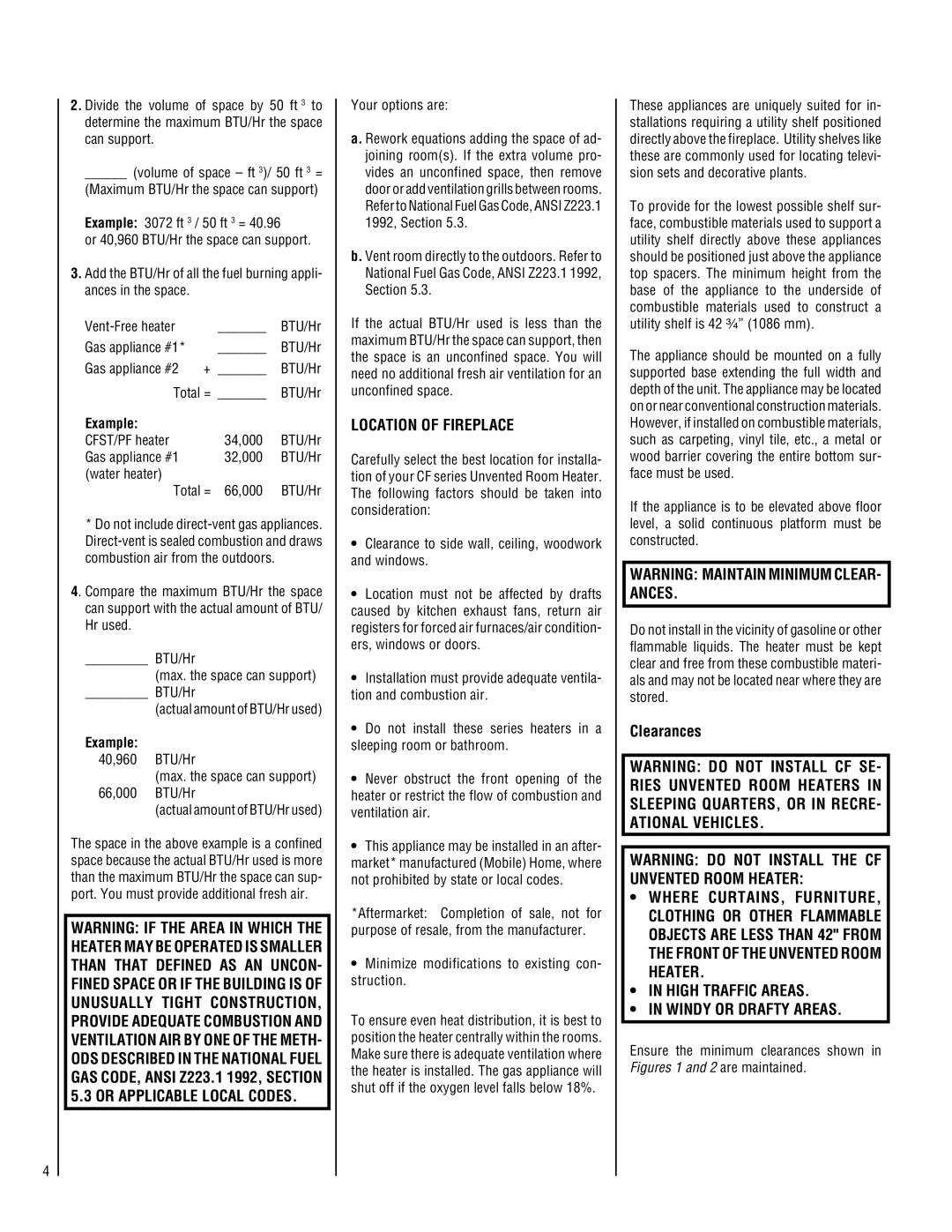
4
2.Divide the volume of space by 50 ft 3 to determine the maximum BTU/Hr the space can support.
______ (volume of space – ft 3)/ 50 ft 3 = (Maximum BTU/Hr the space can support)
Example: 3072 ft 3 / 50 ft 3 = 40.96
or 40,960 BTU/Hr the space can support.
3.Add the BTU/Hr of all the fuel burning appli- ances in the space.
_______ | BTU/Hr | |
Gas appliance #1* | _______ | BTU/Hr |
Gas appliance #2 | + _______ | BTU/Hr |
Total = _______ | BTU/Hr | |
Example: |
|
|
CFST/PF heater | 34,000 | BTU/Hr |
Gas appliance #1 | 32,000 | BTU/Hr |
(water heater) |
|
|
Total = 66,000 | BTU/Hr | |
*Do not include
4. Compare the maximum BTU/Hr the space can support with the actual amount of BTU/ Hr used.
_________ | BTU/Hr |
| (max. the space can support) |
_________ | BTU/Hr |
| (actual amount of BTU/Hr used) |
Example: |
|
40,960 | BTU/Hr |
| (max. the space can support) |
66,000 | BTU/Hr |
| (actual amount of BTU/Hr used) |
The space in the above example is a confined space because the actual BTU/Hr used is more than the maximum BTU/Hr the space can sup- port. You must provide additional fresh air.
WARNING: IF THE AREA IN WHICH THE HEATER MAY BE OPERATED IS SMALLER THAN THAT DEFINED AS AN UNCON- FINED SPACE OR IF THE BUILDING IS OF UNUSUALLY TIGHT CONSTRUCTION, PROVIDE ADEQUATE COMBUSTION AND VENTILATION AIR BY ONE OF THE METH- ODS DESCRIBED IN THE NATIONAL FUEL GAS CODE, ANSI Z223.1 1992, SECTION 5.3 OR APPLICABLE LOCAL CODES.
Your options are:
a. Rework equations adding the space of ad- joining room(s). If the extra volume pro- vides an unconfined space, then remove door or add ventilation grills between rooms. Refer to National Fuel Gas Code, ANSI Z223.1 1992, Section 5.3.
b. Vent room directly to the outdoors. Refer to National Fuel Gas Code, ANSI Z223.1 1992, Section 5.3.
If the actual BTU/Hr used is less than the maximum BTU/Hr the space can support, then the space is an unconfined space. You will need no additional fresh air ventilation for an unconfined space.
LOCATION OF FIREPLACE
Carefully select the best location for installa- tion of your CF series Unvented Room Heater. The following factors should be taken into consideration:
•Clearance to side wall, ceiling, woodwork and windows.
•Location must not be affected by drafts caused by kitchen exhaust fans, return air registers for forced air furnaces/air condition- ers, windows or doors.
•Installation must provide adequate ventila- tion and combustion air.
•Do not install these series heaters in a sleeping room or bathroom.
•Never obstruct the front opening of the heater or restrict the flow of combustion and ventilation air.
•This appliance may be installed in an after- market* manufactured (Mobile) Home, where not prohibited by state or local codes.
*Aftermarket: Completion of sale, not for purpose of resale, from the manufacturer.
•Minimize modifications to existing con- struction.
To ensure even heat distribution, it is best to position the heater centrally within the rooms. Make sure there is adequate ventilation where the heater is installed. The gas appliance will shut off if the oxygen level falls below 18%.
These appliances are uniquely suited for in- stallations requiring a utility shelf positioned directly above the fireplace. Utility shelves like these are commonly used for locating televi- sion sets and decorative plants.
To provide for the lowest possible shelf sur- face, combustible materials used to support a utility shelf directly above these appliances should be positioned just above the appliance top spacers. The minimum height from the base of the appliance to the underside of combustible materials used to construct a utility shelf is 42 ³⁄₄” (1086 mm).
The appliance should be mounted on a fully supported base extending the full width and depth of the unit. The appliance may be located on or near conventional construction materials. However, if installed on combustible materials, such as carpeting, vinyl tile, etc., a metal or wood barrier covering the entire bottom sur- face must be used.
If the appliance is to be elevated above floor level, a solid continuous platform must be constructed.
WARNING: MAINTAIN MINIMUM CLEAR- ANCES.
Do not install in the vicinity of gasoline or other flammable liquids. The heater must be kept clear and free from these combustible materi- als and may not be located near where they are stored.
Clearances
WARNING: DO NOT INSTALL CF SE- RIES UNVENTED ROOM HEATERS IN SLEEPING QUARTERS, OR IN RECRE- ATIONAL VEHICLES.
WARNING: DO NOT INSTALL THE CF UNVENTED ROOM HEATER:
•WHERE CURTAINS, FURNITURE, CLOTHING OR OTHER FLAMMABLE OBJECTS ARE LESS THAN 42" FROM THE FRONT OF THE UNVENTED ROOM HEATER.
•IN HIGH TRAFFIC AREAS.
•IN WINDY OR DRAFTY AREAS.
Ensure the minimum clearances shown in Figures 1 and 2 are maintained.
